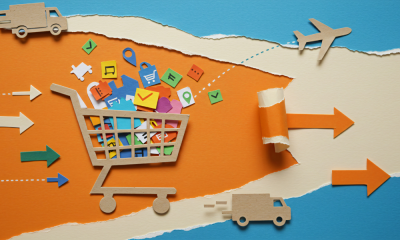How publishers and Air Business are evolving beyond the page

Facing challenges to their traditional business model, publishers have focused on finding new ways to monetise their brands. And, as Air Business’s Adam Sherman tells James Evelegh, Air Business has focused on developing services to help them do that.
“The long-term transition from print to digital and the competition from social media for peoples’ attention are two trends impacting the business models of publishers and their suppliers”
Adam Sherman, CEO of Air Business
Publishers are having to diversify their revenues, and suppliers are having to diversify their services and develop new areas of expertise to meet publishers’ evolving needs.
I met with Adam in June to discuss the progress Air Business was making with its own business transformation plan and to see what publishers might take away from their experiences.
Last year, Adam and his senior team conducted a root and branch review of their business, to identify areas with growth potential. This took time but was worth it. They came up with a comprehensive growth plan involving global event logistics, subscription management and global e-commerce logistics.
What progress have they made, I ask…
Event logistics
In-person events and conferences represent a massive opportunity for publishers, especially in the post-lockdown world.
Recognising this, Air Business has strategically expanded into event logistics, investing significantly in staff and infrastructure. Air Business handles every aspect of event logistics, from global transport, customs clearance, local delivery and storage to onsite management. From a standing start last year, they are now managing the logistics for twenty events and expect that figure to grow to 50-100 in 2026.
Earlier this year, they bolstered their events team with the appointments of Paul Brady as head of strategic partnerships and Luke Stephens as head of event operations and strategy, both reporting to Lenka Booker, strategy and transformation director, who also leads their Global Event Logistics division.
Handling the logistics for Decanter’s Fine Wine Encounter in New York in June was a recent highlight, as was being appointed the official event logistics partner for some of the Mark Allen Group shows. More such partnerships are in the pipeline, says Adam.
Subscriptions
ABS, their subscription division, has been making inroads beyond its traditional B2B and B2C publishing client base and is investing heavily in the academic sector, which majors in high value subscriptions and single issue (book) products requiring exceptional customer service, whether that customer is an individual, institution, society or agent.
Their other focus is on winning more business from membership organisations, which have very similar needs to publishers when it comes to list management and customer service.
e-Commerce
Over the last few years, Adam has noted a dramatic rise in the creation and marketing of publisher-branded merchandise, everything from mugs and desk diaries to t-shirts and golf balls, as well as other single product sales such as books and bookazines.
To support this surge in activity, Air Business has made significant investments in its e-commerce infrastructure. This includes the introduction of a new warehouse management system and continuous development of Consero, their proprietary e-commerce software platform. A standout feature of Consero is, says Adam, its ‘control tower’ functionality, which provides publishers and e-commerce providers with a 360-degree view of their operations.
In 2023, Air Business appointed Darrell Sweeney as e-commerce service delivery director. Since then, he has been working to consolidate and expand the company’s global network of partners — including national postal authorities, commercial logistics providers, final-mile delivery companies, and collection networks.
Under the leadership of Andy Haylar, who heads up the e-commerce and technology divisions, Air Business has achieved major wins — including partnerships with Singapore Post and several global retailers, wholesalers, and postal authorities.
According to Adam, these collaborations have extended the company’s reach to virtually every corner of the world.
From their experiences with their own business transformation over the last couple of years, I ask Adam, what lessons can publishers learn and apply to their own businesses?
He identified eight learnings that might also apply to publishers:
1. Remember the future is digital, but don’t forget print.
“To pretend that digital consumption of content won’t continue to grow is misguided, but print remains the biggest subs generator for most consumer titles. So, publishers should plan for a digital future but continue to nurture their valuable print offering.
“Even with all the new things that we’re developing and that are growing at pace, we believe in three years’ time, print will still be our predominant vertical sector.”
2. Pursue sustainable growth and don’t over-extend.
“Failure to deliver on promises can seriously damage your brand. So, the delivery of new services needs to be meticulously planned.
“With our new event logistics services, we invested in resource and talent prior to going out into the market. We decided to invest to make sure we’re ready and that we don’t drop the ball with anything.
“We now have a sustainable model created, so we know at every point what resource we need to be able to continue to provide a fantastic service on behalf of our customers. At no point will we take business on without being absolutely sure that we’ve got the resource in place to deal with it.”
3. Leverage the brand.
For Adam, all this activity shows how the company is leveraging the Air Business brand. They have been providing distribution and subscriptions management services for almost 40 years; providing event logistics and e-commerce services were natural extensions of what they do already and align with existing skill sets.
“Just as offering event logistics and e-commerce services is us leveraging our brand, we would encourage publishers to look for new ways of leveraging theirs. For instance, by finding other things to sell. Your readers like you, trust you and are prepared to spend money with you, so find more things to sell to them. We all need to take a wider view of our business universe and be more imaginative in what we can offer our customers.”
4. Never forget the importance of customer service.
“One thing we found that is common amongst all the verticals we’re working on is the need for great customer service. Every one of those vertical sectors loves the fact that we are so accessible, right the way up to chief executive.
“For subscriptions publishers, the service we provide on their behalf and which we passionately believe is the right approach, includes: answering the phone within an acceptable number of rings, having customer service staff trained to be able to resolve the vast majority of problems in one call and who respond in a professional tone at all times, that follow-up or remedial action is delivered as promised, that an effective cancel-save strategy is in place to minimise the impact of cancellations, but one which never involves bullying or other under-hand tactics.
“Great customer service builds the brand, poor customer service damages it – just look at Trustpilot to see what happens when publishers get customer service wrong, by for instance, making it nigh-on impossible to either cancel or speak to someone.”
5. Think global.
Providing a fit-for-purpose e-commerce and event logistics offering has involved Air Business having to expand and consolidate its global supplier and partner base.
“Publishers should be thinking globally too,” says Adam.
“After Brexit, a lot of publishers decided to stop trading with the EU because of the hassle involved in making customs declarations and the like.
“Over the years, we’ve developed the knowledge, expertise and technology to be able to assist customers in how to start trading again easily with customers in the EU.
“So, we’re working hard to educate our publishing clients on how we can help them get back into Europe easily, because it represents a great growth opportunity.”
When it comes to events, many event organisers are now exploring geo-cloning – replicating successful events in new international markets. While this can feel daunting, says Adam, finding the right partner makes all the difference: “With our deep understanding of key global territories, we can help the organiser and their exhibitors navigate the complexities.”
E-commerce is another major enabler of international growth: “Through our Consero platform and growing network of global hubs, we offer publishers the ability to scale up their global e-commerce offering,” says Adam: “E-commerce logistics is the bridge between your brand and the global customer.”
6. Don’t take short cuts when it comes to planning.
“We decided right at the beginning that the key to providing robust event logistics services was having plan a, plan b, plan c and plan d. So, for everything we do, before we do it, we ensure that we look at every contingency, so that should something go wrong, we can mitigate any impact upon the customer’s experience.”
Air Business’s focus is on the logistics side of events, but the importance of planning extends to all aspects of event organising. What’s your plan b in the event of inclement weather, tube strikes, your venue going out of business, key speaker no-shows, pandemics et al? Someone needs to have thought about it…
7. Make clever use of AI.
AI is in the plans, or fever dreams, of most publishers, and their suppliers too!
Both publishers and suppliers need to work out how AI can improve the delivery of their services.
“At Air Business, we are exploring its potential to improve the customer service experience. This doesn’t mean forcing customers to deal only with a chatbot, but rather giving them the option of using one.”
Paul Hatch, group customer director, has done a lot of work in this area.
“His view is that every time a subscriber contacts customer services, they should have a choice. If it’s a human they wish to speak to then they should be able to do that, but if it’s a relatively simple query that could quickly and easily be answered by a seamlessly integrated virtual agent, then we want to make that option available as well.
“We are giving customers choice but not nudging them towards one area or the other; it’s only there to enhance the customer’s experience.
“AI is also being explored to enhance e-commerce fulfilment forecasting, returns optimisation, and even dynamic pricing for publisher e-commerce stores. The goal isn’t to replace human insight – but to augment it with real-time intelligence.”
8. Find your growth path.
“Managing decline is morale sapping; finding sustainable growth opportunities allows you to reshape your business, liberating and energising your teams.
“Our transition has been about pursuing paths that were natural extensions of our existing business. By focusing on growth, the impact has been significant,” says Adam: “It’s the most exciting and energising period in our history. Our diversification strategy has proved absolutely the right thing to do; the new business units are gaining traction and everyone internally is onboard with our growth strategy. We’re absolutely buzzing!”
The lesson for publishers is: take time out to comprehensively assess your business, your markets and where growth will come from, then commit fully to the plan.
“And,” concludes Adam, “if your growth plan involves events, subscriptions, or e-commerce, then get in touch to see how we can help.”
Credit: James Evelegh, InPublishing (22.08.2025)
News
Insights, updates, and stories from behind the scenes at Air Business, delivered straight from the team.


